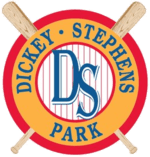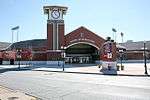Dickey-Stephens Park
 | |
|
| |
| Location |
400 West Broadway Street North Little Rock, AR 72114 |
|---|---|
| Coordinates | 34°45′19″N 92°16′21″W / 34.755215°N 92.272582°WCoordinates: 34°45′19″N 92°16′21″W / 34.755215°N 92.272582°W |
| Owner | City of North Little Rock |
| Operator | Arkansas Travelers Baseball, Inc. |
| Capacity | Baseball: 7,200 (5,800 fixed seats) [1] |
| Field size |
Left field - 332 ft Left Center - 360 ft Center Field - 400 ft Right Center - 375 ft Right field - 330 ft |
| Construction | |
| Broke ground | November 30, 2005[2] |
| Opened | April 12, 2007 |
| Construction cost |
$40.4 million ($46.2 million in 2016 dollars[3]) |
| Architect |
HKS, Inc.[4] Taggart Foster Currence Gary Architects, Inc. Witsell Evans Rasco |
| Structural engineer | Jaster-Quintanilla & Associates[4] |
| Services engineer | Smith Seckman Reid Inc.[4] |
| General contractor | Hensel Phelps/East-Harding[2] |
| Tenants | |
| Arkansas Travelers (TL) (2007–present) | |
Dickey-Stephens Park is a baseball park in North Little Rock, Arkansas, USA. The ballpark is primarily used for baseball and serves as the home for the Arkansas Travelers of the Texas League. The capacity of the ballpark is 7,200 which includes 5,800 fixed seats capacity for 1,500 on the berms. [1] It opened in 2007 as a replacement for Ray Winder Field in Little Rock, Arkansas. The ballpark is named after four local Arkansas brothers: Baseball Hall of Famer Bill Dickey, former Major League Baseball catcher George Dickey, and businessmen Jackson T. Stephens and W.R. Stephens.
History
The majority of the ballpark's cost - about 83% - was paid for by the public. On August 9, 2005, 54.3% of voters of North Little Rock approved a temporary 1% sales tax increase that funded $28 million of the cost from the two years the tax was collected. Another $5.6 million was to be raised from ballpark revenue. On the private side of the ledger, Warren Stephens made a financial contribution of $440,494 and a land donation valued at $6.3 million. Also, the North Little Rock City Beautiful Commission donated $15,000.[2]
The ballpark was designed by HKS, Inc. of Dallas, Texas while the general contractor was a joint venture of Hensel Phelps Construction of Austin, Texas and East-Harding Construction of Little Rock, Arkansas. A groundbreaking ceremony was held on November 30, 2005 with the actual construction beginning on January 26, 2006. The construction was completed on March 27, 2007, spanning over a period of 426 days.
The ballpark opened on April 12, 2007, where the Frisco RoughRiders beat the Travelers 6-5 with 7,943 fans in attendance.[2] The ballpark was also the location where Tulsa Drillers batting coach Mike Coolbaugh was killed during a game against the Travelers. During the July 22, 2007 game, Coolbaugh was struck in the neck by a hard struck line drive as he was standing in the first base coaches box, and died an hour later from the impact of the injury that resulted in a severe brain hemorrhage.[5] The result of Coolbaugh's death led to decision by Major League Baseball general managers to require base coaches to wear helmets on the field during games, starting with the 2008 MLB season.[6]
Gallery
-

Entrance to the ballpark in December 2008 -
Field and grandstand from center field in July 2009 -

Field from grandstand behind home plate in July 2009
References
- 1 2 "Dickey-Stephens Park". Arkansas Diamonds: The Ballparks of Arkansas and Their History. Retrieved 4 May 2015.
- 1 2 3 4 Knight, Graham (August 14, 2010). "Dickey-Stephens Park - Arkansas Travelers". Baseball Pilgrimages. Retrieved April 10, 2012.
- ↑ Federal Reserve Bank of Minneapolis Community Development Project. "Consumer Price Index (estimate) 1800–". Federal Reserve Bank of Minneapolis. Retrieved October 21, 2016.
- 1 2 3 "Arkansas Travelers Minor League Stadium Project Information". Reed Construction Data. Retrieved September 23, 2011.
- ↑ Traub, Todd (July 27, 2007). "Remembering Mike Coolbaugh: Standing Salute". Arkansas Democrat-Gazette. Little Rock. Retrieved April 14, 2012.
- ↑ "Coolbaugh's Death Prompts MLB to Adopt Helmets for Base Coaches". ESPN. November 8, 2007. Retrieved August 15, 2012.